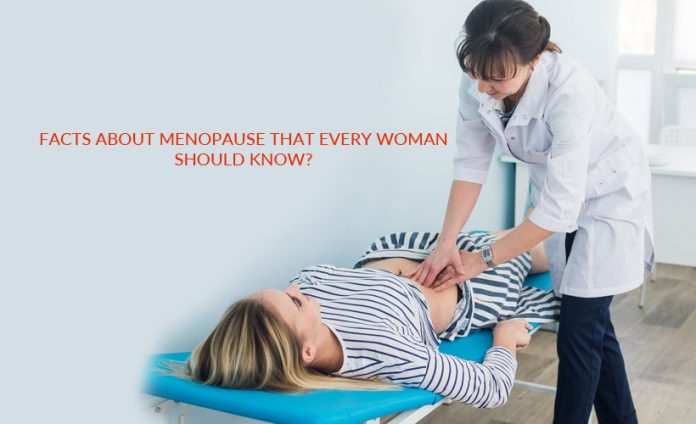Menopause is referred to a woman’s “change of life”, which begins when her period stops. If one has had n periods for a year then one is considered to have attained menopause.
Menopause occurs when one’s stop producing the hormones estrogen as well as progesterone. This decrease in the production of estrogen and progesterone can indeed bring about several changes in one’s body system.
Table of Contents
Symptoms of Menopause
- Hot flashes
- Mood swings
- Sleep difficulty
- Weight gain
- Changes in hair growth and vaginal dryness.
Menopause is a no doubt a life-changing process, and one must be aware of all facts concerning it. It is better to be prepared for it. Required knowledge will indeed help one to overcome the challenges of menopause and thus lead a healthy as well as happy life.
1. The age that Menopause Occurs
The average age that American women do reach menopause is 52, but it can also occur anytime between the ages of 45 and 58.
Most women have their last period sometime between the ages of 45 and 55.
Usually, the age of menopause is considered to be genetically determined and factors such as smoking or chemotherapy can indeed accelerate a decline in the functioning of the ovaries, and thus resulting in earlier menopause.
Factors that Determine Menopause
- Demographics, such as education, employment, and race/ethnicity.
- Menstrual as well as reproductive factors, such as parity as well as oral contraceptive use.
- Familial and genetic factors.
- Lifestyle factors, such as smoking, weight, physical activity cum diet.
Read More: Genius home remedies Everyone Should Know!
2. Early Menopause May Happen
The average of menopause in the U.S. is 52, some women may reach it early. Based on experts viewpoint it is accepted that menopause occurs before the age of 40 and is referred to as early menopause.
Contributing factors to Early Menopause
- Genetics
- Abnormal thyroid
- A rheumatic disease, such as lupus.
Other Factors that cause Early Menopause
- Chemotherapy
- Radiation also damages the ovaries and lead to early menopause.
- Those women whose ovaries have in fact been removed as part of a medical treatment also do undergo early menopause.
- Smoking is another reason behind early menopause.
Read More: Six Natural Foods that Fight Infections
3. Perimenopause is Not Menopause
One must not confuse perimenopause with menopause. They are in fact two different health issues:
- Perimenopause actually refers to the period of time right before one’s menopause begins.
- One enters the menopause stage officially once when one has completely stopped having a menstrual cycle for about 12 consecutive months.
- During perimenopause, one’s body does begin the transition into menopause. During this period, the body does make less and less of the hormones that do control one’s period – estrogen and progesterone. On account of such changes in hormone production, one’s menstrual cycle does become irregular, but it will not stop.
- One will suffer from symptoms such as hot flashes, breast tenderness, weight gain, and increase in heart rate, night sweats, insomnia, fatigue, anxiety, mood swings, irritability, and depression.
Menopause indeed does affect a woman in many ways and some are able to cope up with it whereas others undergo depression during that time.

